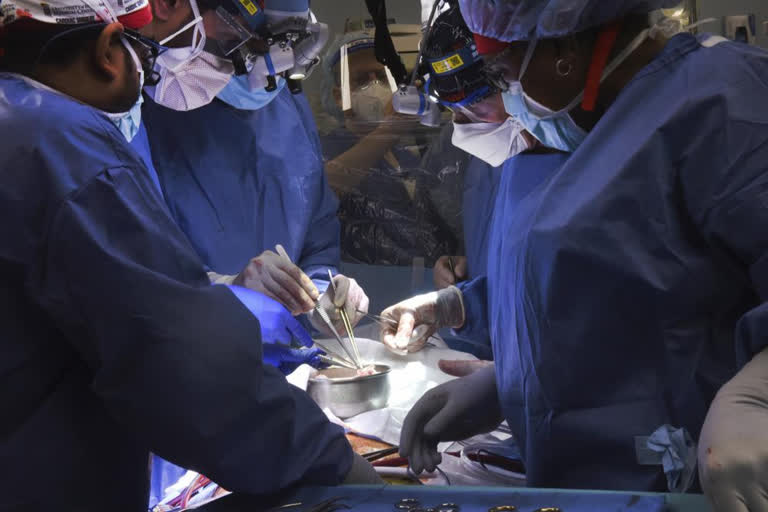Washington: In first-of-its-kind transplant surgery, a 57-year-old Maryland man with terminal heart disease has received a genetically modified pig heart. The patient is doing well three days after the successful surgery.
The patient, David Bennett, a 57-year-old Maryland handyman, knew there was no guarantee the experiment would work but he was dying, ineligible for a human heart transplant and had no other option, his son told The Associated Press.
“It was either die or do this transplant. I want to live. I know it’s a shot in the dark, but it’s my last choice,” Bennett said a day before the surgery, according to a statement provided by the University of Maryland School of Medicine.
On Monday, Bennett was breathing on his own while still connected to a heart-lung machine to help his new heart. The next few weeks will be critical as Bennett recovers from the surgery and doctors carefully monitor how his heart is faring. There’s a huge shortage of human organs donated for transplant, driving scientists to try to figure out how to use animal organs instead. Last year, there were just over 3,800 heart transplants in the U.S., a record number, according to the United Network for Organ Sharing, which oversees the nation’s transplant system.
“If this works, there will be an endless supply of these organs for patients who are suffering,” said Dr Muhammad Mohiuddin, scientific director of the Maryland university’s animal-to-human transplant program. But prior attempts at such transplants — or xenotransplantation — have failed, largely because patients’ bodies rapidly rejected the animal organ. Notably, in 1984, Baby Fae, a dying infant, lived 21 days with a baboon heart.
The difference this time: The Maryland surgeons used a heart from a pig that had undergone gene-editing to remove a sugar in its cells that’s responsible for that hyper-fast organ rejection. Several biotech companies are developing pig organs for human transplant; the one used for Friday’s operation came from Revivicor, a subsidiary of United Therapeutics.
Over the years, scientists have turned from primates to pigs, tinkering with their genes. Just last September, researchers in New York performed an experiment suggesting these kinds of pigs might offer promise for animal-to-human transplants. Doctors temporarily attached a pig’s kidney to a deceased human body and watched it begin to work.
The Maryland transplant takes their experiment to the next level, said Dr Robert Montgomery, who led that work at NYU Langone Health. “This is a truly remarkable breakthrough,” he said in a statement. “As a heart transplant recipient, myself with a genetic heart disorder, I am thrilled by this news and the hope it gives to my family and other patients who will eventually be saved by this breakthrough.”
The surgery last Friday took seven hours at the Baltimore hospital. Dr Bartley Griffith, who performed the surgery, said the patient’s condition — heart failure and an irregular heartbeat — made him ineligible for a human heart transplant or a heart pump. As for the heart transplant, “He realizes the magnitude of what was done and he really realizes the importance of it,” David Bennett Jr. said. “He could not live, or he could last a day, or he could last a couple of days. I mean, we’re in the unknown at this point.”
Griffith had transplanted pig hearts into about 50 baboons over five years, before offering the option to Bennett. “We’re learning a lot every day with this gentleman,” Griffith said. “And so far, we’re happy with our decision to move forward. And he is as well: Big smile on his face today.” Pig heart valves also have been used successfully for decades in humans, and Bennett’s son said his father had received one about a decade ago.
Earlier, the US Food and Drug Administration granted emergency authorization for the surgery on December 31. Three genes that are responsible for the rejection of pig organs by human immune systems were removed from the donor pig, and one gene was taken out to prevent excessive pig heart tissue growth. Six human genes responsible for immune acceptance were inserted, CNN reported.
Bennett's doctors will need to monitor him for days to weeks to see whether the transplant works to provide lifesaving benefits. He will be monitored for immune system problems or other complications. "There are simply not enough donor human hearts available to meet the long list of potential recipients," surgeon Dr Bartley P. Griffith said in a statement.
"We are proceeding cautiously, but we are also optimistic that this first-in-the-world surgery will provide an important new option for patients in the future," he added. In October, surgeons successfully tested the transplant of a genetically modified pig kidney into a woman in New York who was brain-dead, according to CNN.
(with agency inputs)



